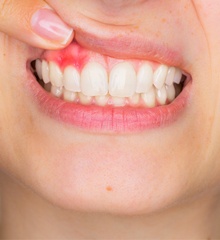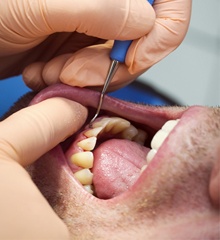Periodontal Therapy – Leesburg, VA
Fight Gum Disease for a Healthy Smile

Did you know that three out of four Americans today suffer from periodontal disease? Also referred to as gum disease, periodontal disease may only exhibit mild symptoms in its earliest stages, but if it’s left untreated too long, it can lead to serious issues, including pain, tissue deterioration, and even tooth loss.
In addition to harming your oral health, gum disease has been linked to overall health conditions such as heart disease, strokes, diabetes, pregnancy complications, and more. Dr. Groy and his team understand and respect the strong connection between oral and general health. That’s why we offer periodontal therapy to treat the disease and prevent re-occurrences.
What Is Gum Disease?
Gum or periodontal disease is actually a bacterial infection that begins with plaque buildup. Plaque is a naturally occurring biofilm that accumulates in our mouths everyday. While plaque is natural, it’s not necessarily beneficial. Hiding in plaque are the bacteria that lead to gum disease and even tooth decay. If not cleaned away with regular brushing and flossing, these bacteria feed on the sugars left in your mouth after you eat, and they excrete toxins that could begin to destroy gum and bone tissue.
What Are the Signs of Gum Disease?

As can happen with many infections, you may notice that your gums become red and swollen. They may even bleed when you brush or floss. If plaque is left to fester, then it hardens and becomes tartar. Now, bacteria are locked in place and begin to cause further damage. You may have:
- Bad breath
- A sour taste in your mouth
- Pus between your teeth
- Receding gums
- Shifting teeth or ill-fitting dentures
What Are the Consequences of Gum Disease?
If the repercussions of gum disease were confined to your mouth, then that would be problematic enough. However, the same inflammation that is associated with gingivitis and periodontitis—the first and second phases of this bacterial infection—is also linked to a number of bodily illnesses and diseases. These include:
- Cardiovascular disease
- Stroke
- Dementia
- Depression
- Diabetes
- Pneumonia and other respiratory illnesses
- Pregnancy complications
Most recently, there is new research that may support a connection between gum disease and Alzheimer’s disease, too. Therefore, periodontal therapy may not only be crucial for your oral health, but for your general health as well.
How Is Gum Disease Treated?

At your initial and subsequent hygiene appointments, we’ll check your gums carefully with a clinical examination for any signs of redness or inflammation. We’ll also probe for periodontal pockets beneath the gum line.
If pockets exist, they can be indicative of bone loss and digital X-rays may be needed to determine the extent of the disease process. If we discover the presence of gum inflammation without bone loss (gingivitis), treatment typically consists of a thorough dental cleaning and home care instructions. If we discover the additional presence of bone loss (periodontitis), treatment may involve more in-depth cleanings, scaling and root planing, and possible surgical procedures.
